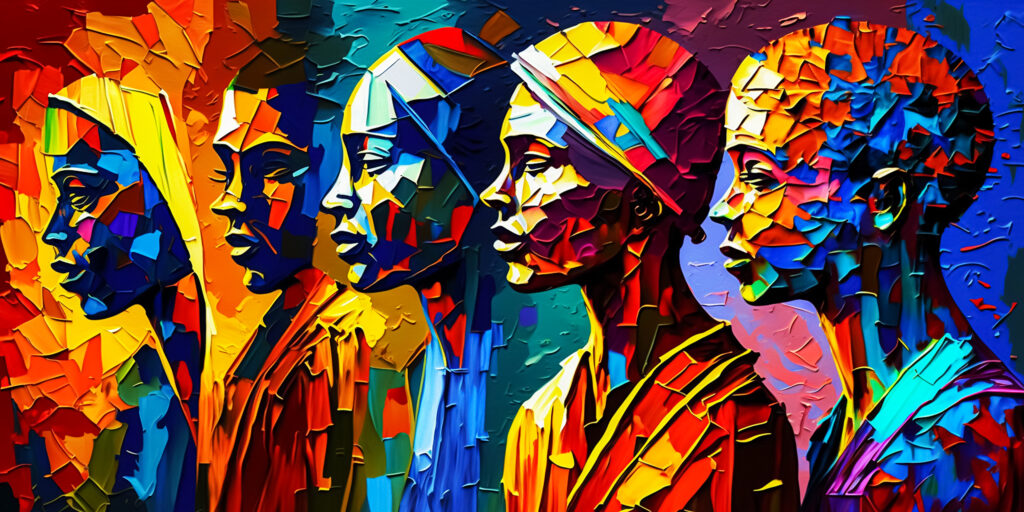Enslaved People and Self-Determination Theory: An Essay Opposition to being able to Benefit from the Immoral Condition of Slavery
[Trigger warning this article contains content that some individuals may find distressing. Distressful content includes information associated with the Atlantic Chattel Slave Trade including human trafficking, rape and other immoral acts.]
Overview
As a studying International Psychologist, I began examining the claims of the Florida State School Board regarding the educational benchmark clarification of standard SS.68.AA.2.3, which states, “Instruction includes how slaves (should say enslaved people) developed skills, which in some instances, could be applied for their personal benefit.” This educational standard has received tremendous backlash both from descendants of enslaved people and others who view slavery as morally wrong and non-beneficial to those subjected to its horrors.
I will discuss the self-determination theory and how resilience and courage are intrinsic self-determined actions which are not reliant upon a condition such as slavery. Further, teaching that enslaved people benefited from slavery to children is in violation of the United Nation’s Universal Declaration of Human Rights regarding education standards. This violation can have severe and negative effects on the well-being of children and society. Children, who will be our future leaders of society, are still forming their perceptions of social constructs like human rights and their respect for such rights. This misleading educational instruction could cause widespread harm and detract from a peaceful society that upholds the human rights of others. Lastly, we will provide a recommended revision of the educational benchmark instruction for the Florida school board.
Statement from the Florida School Board
The school board responded to the backlash with this statement, “The intent of this particular benchmark is to show that some slaves themselves developed highly specialized trades from which they benefited. This is factual and well documented. Some examples include blacksmiths like Ned Cobb, Henry Blair, Lewis Latimer and John Henry; shoemakers like James Forten, Paul Cuffe and Betty Washington Lewis; fishing and shipping industry workers like Juniper Hammon, John Chavis, William Whipper and Crispus Attucks; tailors like Elizabeth Keckley, James Thomas and Marietta Carter; and teachers like Betsey Stockton and Booker T. Washington.”
The school board further went on to say, “Any attempt to reduce slaves (again slaves should be enslaved persons as calling them slaves as a noun reduces them enough. The correct way is to add the condition of slavery as the adjective in the sentence and the noun remains people not slave) to just victims of oppression fails to recognize their strength, courage, and resiliency during a difficult time in American history. Florida students deserve to learn how slaves took advantage of whatever circumstances they were in to benefit themselves and the community of African descendants. It is disappointing, but nevertheless unsurprising, that critics would reduce months of work to create Florida’s first ever stand along strand of African American history standards to a few isolated expressions without context. We encourage everyone to view these robust standards for themselves.”
A Psycho-Social Psychologists’ Perspective
The school board noted that their intent was to teach children about the 1) strength 2) courage and 3) resiliency of enslaved persons during slavery.
Please note that the word “strength” is used too broadly and lacks context. It is unclear how to interpret this word in the Florida school boards’ language use so it will not be examined from a psycho-social view (i.e., it’s fluff language). However, courage and resilience have substance and clear roots in what is called the Self-Determination Theory (SDT). The SDT measures attributes such as resilience and courage and it is important to understand that these are intrinsic motivations that yield results from one’s own efforts. They are not “received” from a condition such as slavery.
Therefore, if the school board intends to show the courage and resilience of enslaved people, then they have two competing arguments to resolve in order to do this effectively:
- First, the standards in educational instruction need to focus on resilience and courage of the people, not what enslaved people received from slavery. Otherwise, the focus becomes that slavery gave them something positive and the intrinsic resilience and courage is replaced with receiving and benefiting from the external condition of slavery.
- Second, the language in the educational instruction is an unethical statement because it indicates that there was a personal benefit from being enslaved. The mid-Atlantic slave trade lasted for centuries so most enslaved people lived and died in slavery enduring torture and physical and psychological trauma. To even imply something was given to them other than this trauma violates the United Nations’ Universal Declaration of Huma Rights, specifically, Article 26 section 2 which states:
- “Education shall be directed to the full development of the human personality and to the strengthening of respect for human rights and fundamental freedoms. It shall promote understanding, tolerance and friendship among all nations, racial or religious groups, and shall further the activities of the United Nations for the maintenance of peace.”
- The violation, I’d like to point out is the duty of the Florida School board to “direct education to the full development of the human personality and to strengthen respect for human rights.” Slavery is listed as a violation of human rights in Article 4, which reads. “No one shall be held in slavery or servitude; slavery and the slave trade shall be prohibited in all their forms.” The educational benchmark creates a psychological narrative that diminishes the respect for human rights because it insinuates that slavery gave something positive to people who were enslaved, while diminishing the personal self-determined achievements. The notion and educational focus of enslaved people benefiting from slavery and the poor examples cited by the Florida School board that were lacking in historical context are incompetent and misleading benchmark standards to provide to students; thus, violating the educational rights of children.
- “Education shall be directed to the full development of the human personality and to the strengthening of respect for human rights and fundamental freedoms. It shall promote understanding, tolerance and friendship among all nations, racial or religious groups, and shall further the activities of the United Nations for the maintenance of peace.”
Psycho-Social Case Studies
Below, Lifestyle Beautiful examined 9 cases of the 16 people that the Florida school board indicated received benefits from the immoral condition of slavery. Included in this examination is a creative psychological perspective (based on historical facts) stated in the first person for each of the persons listed. The first person is used to insert empathy as a perspective sharing format that can help with understanding an opposing viewpoint.
If asked the question to these historic figures, did you develop skills from slavery to apply for your personal benefit?
- Ned Cobb – Well, no. you see, I was born 20 years after the emancipation of enslaved people and worked as an activist and farmer. However, the Florida State School Board listed me as a Blacksmith and said that I personally benefited from skills I obtained while I was enslaved. The skills I learned were self-taught and were gained outside of the horrible condition of slavery. Please do not mislead today’s children and imply that I was given anything from slavery. I was not an enslaved person, and my accomplishments were not derived from slavery in any way.
- Henry Blair – I was never enslaved…so no. I, in no way gained skills from slavery that applied to my personal benefit. It saddens me to hear the Florida State Board of Education is creating this benchmark using my life as a “free” man to teach children that slavery had benefits to enslaved people. I pray for my ancestors and the truth to prevail.
- Lewis Lattimer – I was born in Massachusetts as a (so called) free man. I was also listed as a blacksmith by the Florida school board, however my journey consisted of slave owners trying to re-enslave my family after the Dred Scott case when I was only 10 years old. We had to flee our home. I went to a farm school, then I joined the U.S. Navy when I was 16 and served as a Landsman or Seaman (someone who has less than a year at sea). After being honorably discharged, I got a job as a “Patent Boy.” While I worked a paid wage job, I learned drafting and patent skills and I was promoted for my talents. All my skills that I used for my personal benefit were acquired outside of the deplorable condition of slavery, so to answer your audacious question, no.
- John Henry – I was enslaved and later forced to work the railroads as a prisoner because of the Black Codes that followed slavery. I think the Florida school board listed me as a blacksmith, but I was not a blacksmith, nor did I use skills from slavery for my personal benefit. I do not perceive myself as victim, rather a survivor and had to learn a new skill after slavery just to stay alive. I ended up dying while working “on the railroad” due to my heart giving out from stress. To the Florida school board, you are wrong to say I used skills from being enslaved that I later applied for my personal benefit. My answer to the question is no. I’m not sure what personal benefit you are referring to that I was able to receive from skills I learned during slavery…perhaps you are referring to the indignant unsafe working conditions I died in on the railroad?
- Booker T. Washington – I was born about 9 years before the emancipation of enslaved people. I was denied access to learning how to read by my enslavers. After being emancipated, I taught myself how to read DISPITE being enslaved/forbidden to read. After I was emancipated, I put myself through college working a number of odd jobs that I gained skills from outside of the condition of slavery. I then went on to become a teacher, a founder of a University an activist and an advisor to U.S. Presidents due to reading skills I taught myself after being emancipated. I received no benefit from slavery only trauma (not the 40 acres and a mule, nothing). It is disturbing that the Florida school board would diminish my self-determination and list me as some sort of benefactor of slavery. The answer to the question is an unrebukable no! I did not apply skills obtained from slavery for my personal benefit. To be clear, I thrived despite the disruption and harm of being enslaved. It is preposterous to think that I used the skills from being forced to work as a miner and house boy (who was not allowed to read) to lead me to build a career in teaching, business and activism. My advice to the Florida school board, from one educator to another, is guidance on how to highlight the resiliency and courage of African Americans is already provided in the creation of Black History month. Please visit the Association for the Study of African American Life and History (ASALH) for more insights. Additionally, if you want to use my story and journey, please refer to the Tuskegee University that I founded in 1881. There you will find my complete biography. No mining skills or house boy skills led me to my success. I was successful despite the evils of slavery and slavery in no way benefited me personally.
- Paul Cuffe – I was listed as a shoemaker that may have gained skills from slavery to which I applied for my personal benefit. But there appears to be some confusion in my story. My father was emancipated (my mother a native American) and at the age of 14 I pursued a career as a seafarer, on my own. As a sailor, I was jailed by the British Army, encountered pirates more than once and built relationships with leading families of Nantucket Quakers that became important business partners. I later ran a shipping business using the skills I learned with no connection to slavery. To the Florida school board, if you would like to use my story, and teach children my resilience and courage, please confer with the Paul Cuffe Organization. I was never enslaved, and I’d like to be remembered for my self-determination, similar to my African ancestors that had self-taught and traded skills with a rich culture; not for any false claims of being a benefactor of slavery.
- John Chavis – I was never enslaved. I was born into a “free” family and fought in the revolutionary war. My skills were NOT derived from being enslaved and I, like other Americans fought for the freedom of the United States. To plainly answer the question, no. I did not receive skills during slavery that I later applied for my personal benefit.
- Crispus Attuks – When I was enslaved, I was located inland working with cattle. One day, when I was about 26, I finally escaped slavery and developed skills on my own and became a sailor in the fishing industry. Additionally, I became the first person to die in the name of liberty in the Boston Massacre when I was shot by British soldiers. I have been known to be the “first cause for liberty.” To the Florida board of education, if your goal is to celebrate my resilience and courage don’t lead with my inland farming duties that I had during slavery to which I never used when I escaped. You have reduced the evidence of self-determination in my life by teaching children to focus on what I supposedly gained from slavery – which was nothing. Does that answer your question?
- Elizabeth Keckley – I was indeed enslaved. However, my mother taught me how to sew. I made dresses while I was enslaved, and my skills as a seamstress significantly benefited the wealth building efforts of my enslavers. After being sold, raped, and tortured about three times over, I persuaded the purchase of my freedom (along with my son’s) with a two-year contract. Once “freed” I become a businesswoman and made dresses for very influential clients. I attribute most of my success to my ability to reads and write, which I learned in secret despite being enslaved. To the Florida school board, please refrain from teaching children that I gained specific skills from slavery that benefited me personally. Especially, without the acknowledgement of how white society specifically benefited from the free labor I provided for almost 2 decades. Your educational benchmark instruction shows a lack of regard for my true resilience and courage. Rather, it highlights me as an implied benefactor of slavery. If you really want to highlight my courage and resilience, a more intelligent approach for educating children would be to teach them about my forced contributions that my skills made to white society for their personal benefit. While the business I opened was successful, I do not believe I had a personal gain from the skills used in slavery that I learned from my mother. Unless you consider personal benefit as working without being compensated for the first 20 years, then starting a business with a debt owed to me. Yes, reparations that were promised and never realized for the free labor that built this country. It is also my dearest hope that the Florida school board does not intend to insinuate that I would not have acquired these skills had I not been a slave. Had I not been a slave I would still be with my family in my home country, not kidnapped perhaps even sewing – since it existed in West Africa long before slavery.
This article is not an exhaustive list of all the examples indicated by the Florida school board. It is instead a call to action against their perversion of resilience and courage within the African American community reducing enslaved people to benefactors of slavery in any way.
Lifestyle Beautiful believes in solution-based approaches to human rights and well-being issues. Therefore, a recommendation to the Florida school board would be to reassess and revise benchmark standard SS.68.AA.2.3, which states, “Instruction includes how slaves developed skills, which in some instances, could be applied for their personal benefit.”
The recommended benchmark instruction revision that would preserve children’s respect for human rights, support well-being, and encourage healthy psycho-social development of children is as follows: Instruction includes acknowledging the significant unpaid labor contributions that enslaved people made to the United States of America; and the evidence of self-determination (specifically resilience and courage) that the African American community demonstrated during slavery.
Learn how we help workplaces by creating a culture of well-being with embedded DE&I. Contact us today!





